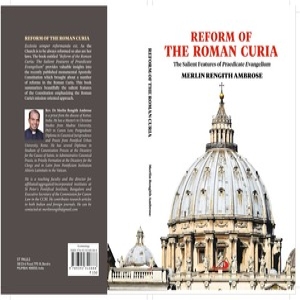
.jpg) Msgr. Francis Vinaixa
Msgr. Francis Vinaixa
.png)
This book by Prof. Merlin Rengith Ambrose (Professor of Canon Law in St. Peter’s Pontifical Seminary, Bangalore and Executive Secretary of the Commission for Canon Law in the CCBI) is a timely work on Pope Francis’ new Apostolic Constitution on the Roman Curia, Praedicate Evangelium. It gives those interested in pontifical law a tool to help them understand it better.
As a matter of fact, the book proves to be a useful guide, accompanied by a thorough examination of the new law on the Roman Curia. It provides an in-depth analysis of the new law on the Roman Curia and explains its purpose and structure, its spirit and context, its history and the changes introduced by Pope Francis in the years preceding its promulgation (on 19 March 2022, with entry into force on 5 June) and which have been brought together with other new provisions.
This book serves as a comprehensive guide that provides a synoptic comparison with the preceding Apostolic Constitution Pastor bonus, thereby underlining the differences between the two documents (in the text and in the final tables on pp. 113-115). It focuses on each of the new Curia institutions in order to highlight their more specific characteristics (in particular in chapters 8 and 9, pp. 75-108). In addition to the clear practical usefulness of this book, the solidity of the canonical study carried out by its author should also be emphasised.
In a succinct summary, the author elucidates in a balanced manner the distinctive features of the Roman Curia, as well as the distinct characteristics of each of the Curia institutions and Offices within it. The book's subtitle shows what the reader will find in its nine chapters.
The author writes in a clear, simple and straightforward manner, which makes the reading quick and pleasant. He presents various topics in a logical and didactic way, with some repetitions when necessary. Moreover, he arranges the content of the book systematically, thereby enabling the reader to swiftly access previously read information when needed.
The book examines the reasons for the reform of the regulations on the Roman Curia. Regarding the structure, I refer to the work itself. However, it is noteworthy that this book demonstrates the ultimate objective of the reform, which is centred around the fulfillment of the Church’s mission. The title – Praedicate evangelium – indicates it, and it is also displayed in the new order of the list of the Dicasteries, where the Dicastery for Evangelisation now occupies the first position, henceforth coming before the Dicastery for the Doctrine of the Faith.
The book emphasises the significance accorded by the Apostolic Constitution to various aspects, including the synodality of the Church, and in this regard, the Episcopal Conferences hold particular significance. Furthermore, the participation of the laity, both male and female, in the spheres of universal governance, including the ability to preside over a Dicastery or Organ, is highly valued.
The Apostolic Constitution itself, in its first two sections (“Preamble” and “Principles and Criteria for the Service of the Roman Curia”) provides an account of the norms enshrined therein, subsequently followed by its 250 articles. Prof. Ambrose’s work gives information and arguments that will help the reader understand the normative text better. See, for example, the observation – in n. 7.3. The Poor as Priority – Ministerio caritatis – that the first three Dicasteries treated in the Apostolic Constitution (the two mentioned above and, thirdly, the Dicastery for the Service of Charity) respond to the three elements present in the Church to which Benedict XVI already referred in Deus caritas est, 25, in the following way: “The intimate nature of the Church is expressed in a triple task: announcement of the Word of God (kerygma-martyria), celebration of the Sacraments (leiturgia) and service of charity (diakonia)” (cf. pp. 73-74).
In the conclusion, the author correctly refers to n. 12 of the Preamble, citing the following crucial warning from Pope Francis: “Reform is not an end in itself, but a means to give a more convincing witness to Christ; to favour a more effective evangelisation; to promote a more fruitful ecumenical spirit; to encourage a more constructive dialogue with all” (cf. p. 111).
In essence, the book reflects the author’s deep affection and love for the Catholic Church.
Those who wish to gain a deeper understanding of the functioning of the Roman Curia and its mission-oriented axis will find this book to be an invaluable resource. The book may be of interest to priests, religious men and women, seminarians, and those who hold offices in the ecclesial structure since it presents the Church’s mission-centred approach to the functioning of the Roman Curia in accordance with the Holy Father's mind.
(The writer is an Official, Dicastery for Legislative Texts, Vatican)